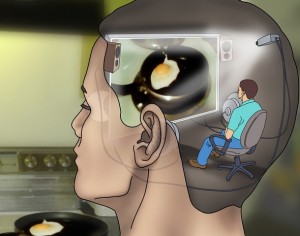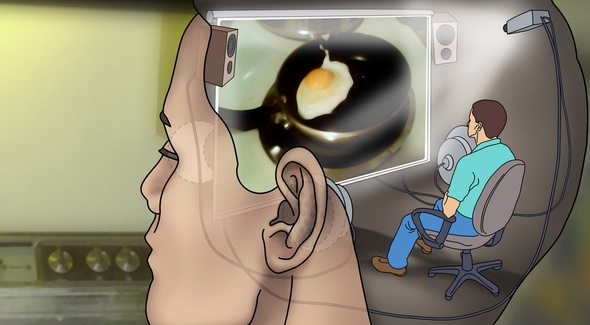[A guest post today from John Perich. Let us know what you think in the comments! –Ed.]

Where can I get me some epistemology like that?
Dualism–the theory that mind and body are two distinct entities which interact with each other–has poisoned human behavior over the last thousand years or so. From dualism, we get the notion that the pleasures of the mind are “noble” while the pleasures of the flesh are “sinful.” We see the separation between inhumane logic and passionate emotion, never imagining that they spring from the same source. It’s taken scientists and philosophers centuries to beat back this curtain of ignorance; progress has been slow.
And then Rick Springfield’s “Jessie’s Girl” comes along and undoes all the good work.
Rock ballads and pop songs have always carried dualism’s banner. Consider the threadbare cliche of “my heart says yes but my mind says no,” the notion that there are two warring entities within the human skeleton, a Soul and a Body, each trying to pull the body a different way. Of course, we can reconcile this trope with more modern notions of perception (e.g., Daniel Dennett’s multiple drafts theory of consciousness) without much difficulty.
“Jessie’s Girl,” however, plants its flag squarely on the turf of the ignorant. Observe: “And she’s watchin’ him with those eyes / And she’s lovin’ him with that body, I just know it.”
Nowhere is the distinction between Soul and Body more explicit. She (Jessie’s Girl) is using a tool (her body) to perform an action (lovin’). She makes a decision (to watch) and selects an implement (those eyes). The redundancy makes Springfield’s pre-rationalism bias explicit: what else would you watch with, if not eyes? Or love with, if not the body?

Mmmm. Homunculus likey eggs.
But Springfield calls attention to the dichotomy. The girl manipulates an object, like some Cartesian homunculus, to achieve a desired end. She’s not lovin’ him; she’s using her body on him.
If you don’t get how pernicious those lyrics are, consider a similar sentence: “I’m going to use my feet to get to the refrigerator, then use my hands to open it and get a beer. You want one?”
That’s just stupid. If you said, “I’m going to get a beer from the fridge,” everyone would know what you meant. There’s no need to spell out the body parts that you’ll be using to get the job done – unless you consider the Body somehow separate from the Mind.
It gets worse: “And I’m lookin’ in the mirror all the time / Wonderin’ what she don’t see in me.”
Subtler, but even more wicked! The homunculus piloting Rick Springfield cannot conceive of itself without mechanical aid. It uses its eyes, and the light reflected off a mirror, to evaluate itself in the eyes of Jessie’s girl…whom it thinks he wishes he had!
This opens all sorts of thorny internal contradictions that bring the song crashing down. When Rick Springfield says, “I wish that I had Jessie’s girl,” is he saying Springfield’s Soul wishes Springfield had Jessie’s girl, or that Springfield’s Body wishes Springfield had Jessie’s girl?
Or, to complicate matters further, is he saying that Springfield’s Soul wishes that Springfield’s Body had Jessie’s girl–that she would use her own Body on him for some lovin’? Is the love shared between man, woman, and Jessie in the 80s a spiritual connection or a purely physical act? Or maybe we should abolish that distinction, like thinking adults, and recognize that the mind/body dichotomy muddles more than it explains, love is a complicated mix of chemistry and idealization, etc, etc.
Please note that The Cars’ “My Best Friend’s Girl” covers similar ground without any theosophical problems, and is therefore a superior song.
Email John at perich at gmail.com.

Another possibility: perhaps the homunculus piloting Springfield wishes it were piloting Jesse’s girl? Or maybe Jesse? Sort of a Body Snatchers/Mephisto Waltz sort of thing?
ISTM the Cartesian dualism error comes more from the subjective perception of an ātman or self (which perception is itself a bit monist) than from the perception of faculties or distinct mental structures. Maybe this seems more natural to a programmer than a normal person, but it’s perfectly conceivable that the activities of particular brain structures can implement particular mental modules that taken together make up behavior and cognition. That seems to be the direction that neurology is heading, anyway. What I’m saying is, dualism is a dead end, but going from there to monism is going the wrong way.
I’ve said for years that “Jesse’s Girl” and “My Best Friend’s Girl” are about the same girl at different times. If you consider that Jesse is the singer of “My Best Friend’s Girl” then we know who Jesse’s girl is now loving with that body…
Two thoughts:
First, I nominate Mary MacGregor’s “Torn Between Two Lovers” to round out the trilogy. It seems roughly to fit the facts as we know them, with the added benefit of also giving Jesse’s now-ex a chance to add her perspective. The main problem would seem to be the songs’ release order, though there’s no reason not to believe either that Jesse and his friend (which I suppose we can’t avoid calling “Rick” [or “Ric”, as the case may be]) could only bear to talk about these events years after they happened, or that our femme fatale simply managed to become famous before either of her suitors, and thus beat them to market with her part of the story.
As for the thrust of the post itself, I think “Rick” is being misunderstood. Rather than betraying a flawed metaphysic, the chief complaint under discussion reveals something far more base. While he may also happen to be a dualist, “Rick” is here identifying himself as a narcissistic hedonist. Thus, his stated concern is never that she loves, or even prefers, someone else, but that he wants access to “those eyes” and “that body”, as mere physical objects, rather than as part of a person, let alone a loved one. That she is only an object to him is reinforced by the fact that he never once even uses her name, and by his later admission that telling her that he loves her would be moot.
Further, the passage about his looking into the mirror wondering what she don’t (sic) see in him, seems to suggest a sociopathic bent in Rick as well. He is evidently incapable of actually feeling or expressing love, and must therefore rehearse what he hopes will be mistaken for real emotion (being “funny” and “cool with the lines”, to use his examples).
Just to close the loop, If “Torn…” is in fact part of the story, it would explain why she would feel free to admit her love for another man. She knows Rick won’t care who she loves as long as it doesn’t interfere with the pleasure he derives from “that body”.
This is the best post EVER! Or maybe I just think that because I’m a Philosophy Grad School drop-out.
Yeah, I’d say there’s definitely some overthinking here. That’s all I’ll say.
Actually I think I will say something as I am a loyal long term fan of Mr. Springfield’s and don’t appreciate his work or him being slammed like this. I think some of you need to listen to some of his later works rather than judge him harshly on only one song.
He has evolved considerably in his lyrics since 1981. On his latest CD, Venus In Overdrive, there is a song called “What’s Victoria’s Secret?” and no it’s not about the underwear. It’s basically the flip side of Jesses Girl and tells us men should look for what’s inside of a woman and not objectify their bodies.
There is another song on that CD, “Mr. PC” that has lyrics that sum up perfectly what I think of this specific article some of the negative opinions given:
On and on and on and on you go tell me Mister PC
Round and round and round and round you go preach it PC
You got a brilliant way of saying nothing at all